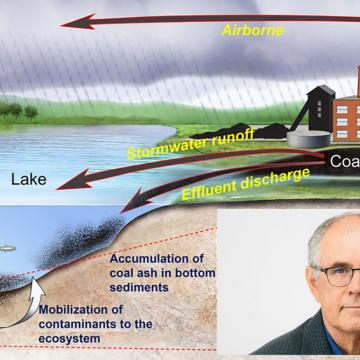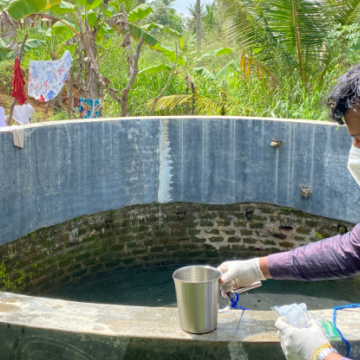-
NewsDuke University scientists have received a five-year, $2.6 million grant from the National Institute of Environmental Health Sciences (NIEHS) to study molecular mechanisms that can help our bodies fight respiratory inflammation caused by air pollution.
-
NewsA new Duke University study finds that municipal waste incinerators' legacy of contamination could live on in urban soils.
-
NewsPeople in areas where drinking water is contaminated with PFAS often want to know their PFAS blood levels but have trouble gaining access to reliable testing, which traditionally involves having their blood drawn by a medical professional.
-
NewsResearchers at Duke University’s Nicholas School of the Environment and Pratt School of Engineering are co-leading a new National Science Foundation-funded project that aims to boost economic development and climate resilience in coastal North Carolina through nature-based scientific and technological innovations.
-
NewsMalaria control programs in Amazonian Peru helped reduce the incidence of the deadly parasitic disease by 78%. That is, until the programs ceased to operate.
-
NewsA new study by researchers at Duke University and WWF aimed to accurately track the expansion and retraction of small ephemeral water bodies from the wet to dry seasons across the KAZA region.
-
News72% of Earth’s largest companies have pledged to reduce their plastic waste. A new study surveys what they’re doing (or not) to fulfill those promises.
-
NewsA new analysis by researchers from 15 institutions evaluates barriers that have hindered the implementation of early warning systems intended to help local health officials predict and proactively respond to outbreaks of climate-related diseases in the Tropics. The researchers use knowledge and tools from the field of implementation science to propose a four-step, science-based framework for overcoming these barriers and enhancing the success of the early warning systems.
-
NewsThe five-year grant renewal will support five new or newly refocused research projects investigating the long-term health impacts of early-life exposures to polycyclic aromatic hydrocarbons (PAHs) and toxic metals such as lead, which are two of the most common classes of hazardous contaminants found today in areas with a legacy of industrial pollution.
-
NewsToxins in lake bottom may become available to food web
-
NewsClimate change threatens species worldwide. At the Nicholas School, we’re creating new geospatial tools that boost their odds of survival.
-
NewsResearchers at Duke University have received a $248,000 grant from the U.S. Environmental Protection Agency to study PFAS exposure risks in the home environment.
-
NewsFirefighters have a 9 percent higher risk of being diagnosed with cancer and a 14 percent higher risk of dying from the disease than the general adult U.S. population, according to studies by the National Institute of Occupational Safety and Health and other agencies.
-
NewsKate Hoffman, an assistant research professor at Duke University’s Nicholas School of the Environment, has received a $3.4 million grant from the National Institutes of Health to study the impact of early-life exposures to semi-volatile organic compounds (SVOCs) on neonatal and early childhood immune function.
-
NewsDuke researchers implement a large water sampling campaign in rural Sri Lanka, aiming to discover the origins of a cluster of chronic kidney disease cases.












